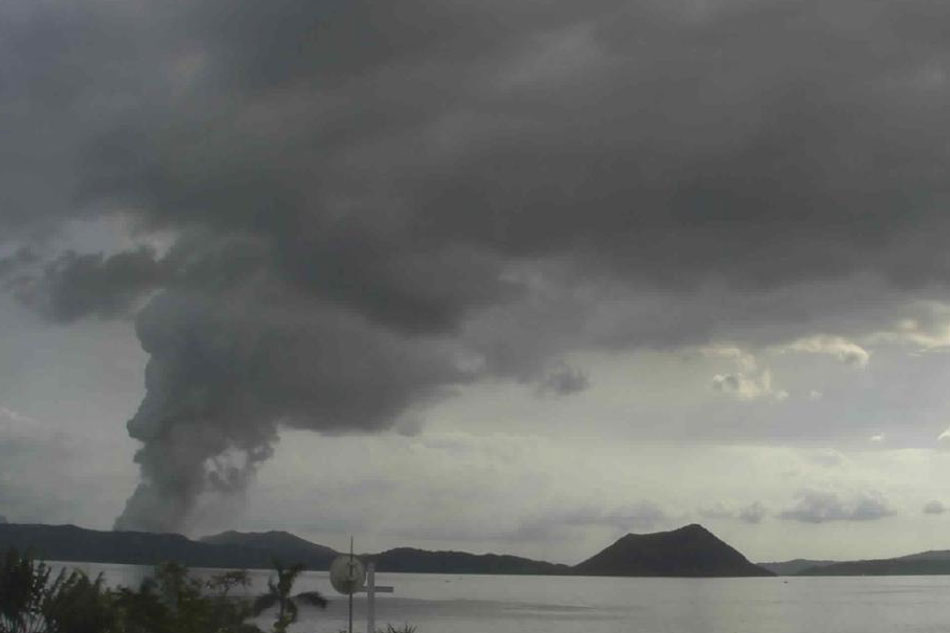Taal 'hazardous eruption' like 'atomic bomb' but won't carry same energy: Phivolcs | ABS-CBN
ADVERTISEMENT

Welcome, Kapamilya! We use cookies to improve your browsing experience. Continuing to use this site means you agree to our use of cookies. Tell me more!
Taal 'hazardous eruption' like 'atomic bomb' but won't carry same energy: Phivolcs
Taal 'hazardous eruption' like 'atomic bomb' but won't carry same energy: Phivolcs
Gillan Ropero,
ABS-CBN News
Published Jan 13, 2020 03:52 PM PHT
|
Updated Jan 13, 2020 03:53 PM PHT
MANILA - A hazardous eruption of Taal Volcano will look like an "atomic bomb explosion" but will not carry the same energy, a state seismologist said Monday.
MANILA - A hazardous eruption of Taal Volcano will look like an "atomic bomb explosion" but will not carry the same energy, a state seismologist said Monday.
The volcano remains under alert level 4 which means a hazardous explosive eruption is possible within hours to days, Phivolcs said.
The volcano remains under alert level 4 which means a hazardous explosive eruption is possible within hours to days, Phivolcs said.
"Siguro ang closest na puwede nating ihambing sa malakas na pagputok ng Taal ay isang atomic bomb explosion 'yung hitsura niya, hindi 'yung energy," Phivolcs volcano monitoring division chief Ma. Antonia Bornas told reporters.
"Siguro ang closest na puwede nating ihambing sa malakas na pagputok ng Taal ay isang atomic bomb explosion 'yung hitsura niya, hindi 'yung energy," Phivolcs volcano monitoring division chief Ma. Antonia Bornas told reporters.
(The closest we can compare a hazardous eruption of Taal Volcano is with an atomic bomb explosion--the appearance of it, not the energy.)
(The closest we can compare a hazardous eruption of Taal Volcano is with an atomic bomb explosion--the appearance of it, not the energy.)
ADVERTISEMENT
Among the hazards of the eruption include base surges or expanding rings of turbulent mixture of fragments and gas at the base of explosion columns.
Among the hazards of the eruption include base surges or expanding rings of turbulent mixture of fragments and gas at the base of explosion columns.
"Meron kang matayog na eruption column tapos meron po na ring na kumakalat mula doon sa base ng eruption column," Bornas said.
"Meron kang matayog na eruption column tapos meron po na ring na kumakalat mula doon sa base ng eruption column," Bornas said.
(You have a towering eruption column and a ring surrounding its base.)
(You have a towering eruption column and a ring surrounding its base.)
"Ito pong ring na ito, ito po 'yung base surge, tumatawid siya ng lawa at tinatamaan niya yung mga pamayanan sa paligid ng lawa. 'Yung base surge po talaga yung primary hazard."
"Ito pong ring na ito, ito po 'yung base surge, tumatawid siya ng lawa at tinatamaan niya yung mga pamayanan sa paligid ng lawa. 'Yung base surge po talaga yung primary hazard."
(This ring is called the base surge, it crosses the lake and can affect surrounding towns. The base surge is the primary hazard.)
(This ring is called the base surge, it crosses the lake and can affect surrounding towns. The base surge is the primary hazard.)
Other hazards include widespread ash fall, landslides, volcanic gas, liquefaction, fissuring, and volcanic tsunami, according to Bornas.
Other hazards include widespread ash fall, landslides, volcanic gas, liquefaction, fissuring, and volcanic tsunami, according to Bornas.
ADVERTISEMENT
ADVERTISEMENT



